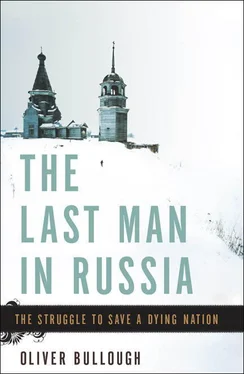Oliver Bullough
THE LAST MAN IN RUSSIA
The Struggle to Save a Dying Nation
Introduction: We will bury you
Misha, a journalist friend, rang me around noon on 1 January 2004. I assumed he was calling to wish me a happy new year. For Russians, New Year is a more important holiday than it is in the West. Presents are exchanged and toasts drunk for success in the year ahead. It is normal to call or text friends if only to laugh with them.
Misha, however, had something different in mind. He had, I later discovered from his girlfriend, been drinking – with breaks only to pass out – solidly for two days already, and he went on to drink for two more.
‘Oliver, listen, I need your help. What is the meaning of the word zombie hedgehog?’
He was speaking Russian, heavily slurred, but still intelligible. He said the last two words in English, however, and clearly wanted me to translate them. I was baffled, and asked what he meant. There was a pause at the other end, then he swore at something or someone in the room with him and hung up. I waited for him to call back, but he never did. When I next saw him, a week or two later, he had no recollection of the call and I never did find out why he had asked.
Misha had an alcohol problem. On a trip to Chechnya a few months later, we got up at around five-thirty in the morning to be sure to arrive in Grozny with plenty of time to work. I had arranged that the hotel would make breakfast for us early. I was drinking tea and waiting for my eggs when Misha walked into the dining room. The waitress asked him what he would like to drink, and he looked around at me.
‘Do you want to drink?’
I shook my head. I needed it clear to work.
‘Give me a bottle of brandy,’ he told the waitress. She brought it, with a single glass, on the same tray as his breakfast. He drank it, shot by shot, while he ate his fried eggs, sausage and bread. He bought another bottle as we were leaving. By the time we reached the Chechen border, he had drunk that too – a litre of brandy before nine in the morning – and insisted we stop for vodka.
This is not one of those stories of journalistic excess that end with the drunkard doing his job despite being barely coherent. (There is an apocryphal Fleet Street photographer who is said to have fallen off his stepladder and still to have shot three perfect frames before hitting the ground.) No, Misha was by turns abusive and sentimental as I tried to get some kind of work out of the day. By evening, he was comatose and a few of us cobbled together some material to send to Moscow under his name.
Although this was an extreme episode, it was not in itself unusual. Many of my colleagues would drink spirits when out of the office, and managers across Russia have learned to incorporate into their plans time lost through drinking. The culture of drinking is so entrenched that the language has a multitude of words to describe the different stages of alcohol abuse. Z apoi means the kind of multi-day bender Misha had survived over the New Year. Opokhmelitsya is a verb meaning to have a drink in the morning to remove a hangover (it is a crucial element of a zapoi , but exists in other contexts too). Peregar is the smell of alcohol from a mouth in the morning.
This is a habit not only of the destitute. Misha was a successful, talented and well-paid journalist. He and his colleagues drank in ways I had never seen before. And, although Russian men do drink more than women, this is not by any means a uniquely male problem. Anyone travelling to work on the Moscow metro in the morning will see well-dressed, made-up young women drinking beer out of cans. In Russia, buying alcohol is easier than buying bread. Kiosks have whole walls of vodka, which they sell for as little as £3 for a half-litre.
While hiking in the wilds near Siberia’s Lake Baikal, my brother and I met a small group of fellow outdoor enthusiasts and we decided to camp together for the night. They were the first people we had seen for a couple of days, and we brought out a bottle of vodka we had been saving for just such an occasion. Our offer was met not with alacrity, however, but with scorn. One of the group, a professor from a university in Novosibirsk, explained, as if talking to a child, how real hikers behave. Real hikers watch every gram they carry, he said. They have no space in their rucksacks for such indulgences as vodka. I was wondering whether perhaps Tom and I should find somewhere else to camp, when he reached behind him.
‘This is what you need,’ he said, drawing a brown bottle out of his rucksack. It was what the Russians call spirt , pure alcohol. I saw his point. If you want to get drunk, why waste space carrying vodka – with its 62.5 per cent of water – when you can carry the same volume of alcohol and get the water from a stream?
The evening of the day when Misha overdid it in Chechnya, we were cooped up on a military base. It was then illegal for foreign journalists to travel in Chechnya without an escort (this was both for our protection and to stop us getting any work done), and we had to be in the barracks long before the sun set and the violence started. Misha was asleep but I was not, so another journalist and I passed the hours before bed chatting to Ilya Shabalkin, a colonel who acted as spokesman for the federal forces, and a couple of other officers. Shabalkin brought out a two-litre bottle of Dzhelka, a cheap but not undrinkable brand. I had contributed a small bottle of Green Stamp, a brand then fashionable in Moscow.
I quickly fell behind. How much you can drink is a sign of your masculinity, and Russians have a multitude of sayings to ridicule anyone who tries to stop early or to skip a round (‘If you won’t drink with us today, you’ll betray your homeland tomorrow’ is one example). Fortunately, foreigners tend to be exempt, it being understood that we are already inferior. I could only watch as these four men – three of them holding high rank in the Russian armed forces, and the other a successful reporter – drained the bottles like an ebbing tide. By the time I crept away to bed, there were three empty bottles on the table, and they had started on a fourth. That is more than six litres of vodka among five people, one of whom was barely drinking, on a weekday. And they had not yet finished.
When Russians drink vodka, they do not sip it, or mix it with juice. They drink shot after shot, each one followed by a quick bite of gherkin or bread. Russian vodka normally tastes chemical, like an unsuccessful science experiment. Unlike with whisky, wine or beer, there is no effort to make the drink itself enjoyable. It is a means to an end, a vehicle to get you drunk. I will drink vodka if I have to, but rarely out of choice. When I can, I drink beer instead, which means I can usually remember the night’s events the next morning.
Russians have always had a reputation for drinking. One of the first mentions of them in the historical record features their king rejecting Islam because of its prohibition on alcohol. The average Russian drinks three times the volume of spirits drunk by a German, and four times that of a Portuguese, and that’s only the official figures. No one has any idea how much self-distilled moonshine is drunk, but it must be a lot, for every traveller in Russia has a story about it.
I was once on an overnight train from St Petersburg to Moscow. I had bought the cheapest ticket, and was one of eight passengers sitting bolt upright in a dingy compartment as the train crawled through a dark forest. We had all brought beer to drink, but the bottles were finished now, and lay littered around our feet. We were semi-drunk and morose, staring ahead at the gloomy outline of the person opposite.
Читать дальше












